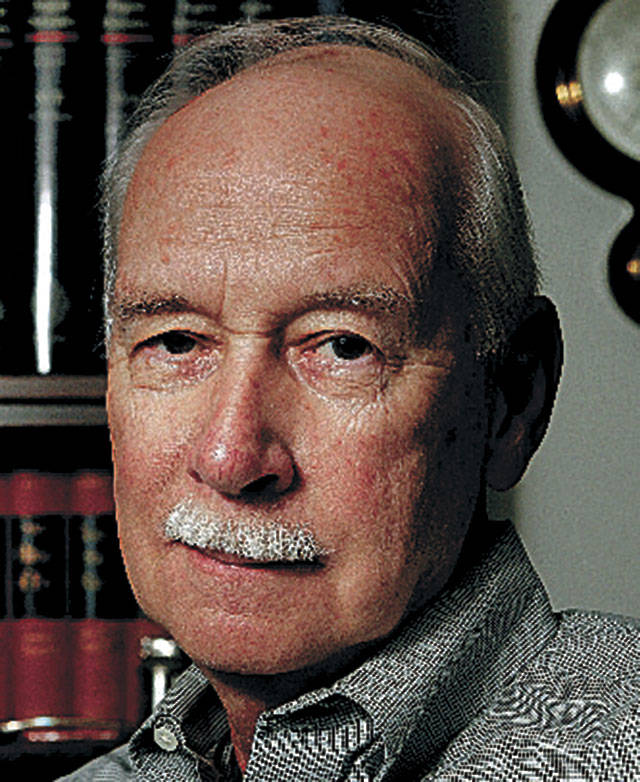“Utopia” was a work of fiction written by Thomas More and first published in Latin in 1516. Still in print, it is the primary source document for today’s political arguments over an important economic policy.
The latest move toward Utopia is called “UBI,” for Universal Basic Income. And while Latin is no longer the language of scholars, the letters spell out a word in that now languishing language.
Memory from high school Latin, with a booster shot from the internet, explains that “ubi” means “where?” It is the perfect question to ask when looking at a today’s utopian idea, almost as if Thomas More planned it that way.
UBI is a program that would distribute money to people who don’t have much of it. And in today’s political world, the basic question about UBI is ubi — as in where will the money come from? The checks the government would distribute in a UBI plan have to be backed up with funds from somewhere.
Liberals tend to view UBI as an add-on to existing welfare programs, while conservatives see it as a replacement for welfare — the principal difference being where the money would come from. If UBI replaces welfare, its funding would come from existing welfare programs that are shut down. If it is added on to welfare, the funding must come from a new source, which boils down to increased taxes. Both arguments are less ideological than financial.
Today’s UBI is a modified version of the utopian ideas and experiments that followed in the years after Thomas More’s book was published. The high-water mark for utopian thought was probably the 19th century. That is when the Utopian Socialist movement energized the British aristocracy and several communes were established in the U.S.
From an economics standpoint, the foundation of utopian ideas like today’s UBI is the concept that a free market capitalist economy is so productive that there will be an abundance of goods and service and a corresponding decline in the need for labor.
Even Karl Marx was influenced by this abundance idea and incorporated it into his theory of socialism as, “From each according to his ability, to each according to his needs.”
Utopian concepts worked a lot better in dreams than in the awake time of real life. The Virginia Colony, for example, started out as a commune, and its members began to starve to death. The leaders abandoned the communal structure and the colony’s economy quickly turned around with enough food for all. Later in our history, communes established in the 19th century — most famously, New Harmony in Indiana — promptly encountered financial problems and faded out of existence.
While some of the utopian communes had cult-like dimensions, the underlying economic system was communal ownership, not charismatic leadership. The American cults of the 20th and 21st centuries had an economic foundation closer to a Ponzi scheme than to utopian socialism.
It is not clear what prompted the re-emergence of utopian economic thought, but a recent shift in the justification for the program may offer a clue. The latest rationale for UBI is that it will offset the displacement and unemployment caused by artificial intelligence and robotics.
This sounds familiar and, at the same time, eerily like a script for a sci-fi battle for human existence. There is a resemblance to Marx’s description of the “vast army of the unemployed,” one of his predictions that failed to materialize. At the same time, the awesome potential of AI and robotics does present us with some interesting problems, including what kind of economy will best make this potential congruent with our values.
UBI is not going to go away. The ideas behind it have survived centuries of failure after failure and will not quietly disappear. Just recently, the government of Finland, which has been conducting a two-year experimental UBI, announced that they would not be renewing the program. Like those bacteria that live on toxic materials, though, the UBI idea will somehow find a way to survive.
UBI may be utopian but it is most certainly socialism, which has its own history of failures. Even in a modern economy, which should have the advantages provided by abundance, socialism consistently fails. As Margaret Thatcher, the U.K.’s first woman prime minister, once said, “The problem with socialism is that you eventually run out of other people’s money.”
The problem with partisan political is that it limits our options. There is nothing wrong with the argument based on “ubi” — where’s the money coming from — but it traps us in a flawed 19th century idea that would still be flawed even if we had the money. We need better, more open minds on the broad questions raised by AI and robotics.
James McCusker is a Bothell economist, educator and consultant.
Talk to us
> Give us your news tips.
> Send us a letter to the editor.
> More Herald contact information.

























